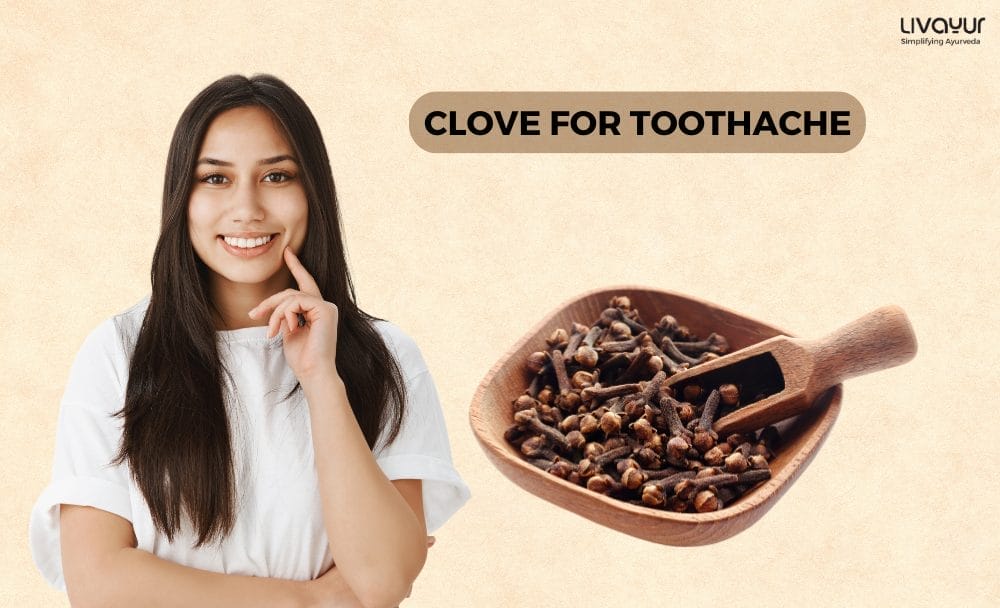Toothaches are extremely painful, and consulting a dentist to obtain relief can be quite inconvenient. One of the preferred natural remedies to combat toothache is cloves. For centuries, cloves have been used as a pain-relieving ingredient. Throughout history, natural treatments called for inserting clove into an infected tooth as well as cavities. Cloves contain an active ingredient called eugenol, which can successfully numb the skin that it comes in contact with. In this manner, cloves may offer temporary relief from toothaches. Today, rather than grinding cloves, clove oil is used. This oil is the concentrated, extracted product from the clove plant.
How Clove is Beneficial for Toothache?
Clove oil contains eugenol as its active ingredient, which functions as a natural anaesthetic. It helps to numb and reduce the tooth pain experienced during a toothache. Eugenol also possesses natural, anti-inflammatory properties. It can cause a reduction in swelling and irritation in the affected region.
A British study concluded that eugenol is far more effective in reducing inflammation, pain, and infection in comparison with other analgesics. In this study, participants who used the paste derived from eugenol also experienced better wound healing in comparison with study participants who used other forms of treatment or no treatment at all.
Another study focused on homemade clove gel, 20% benzocaine, and a placebo. They found that both clove gel and benzocaine reduced pain drastically. Moreover, the clove gel was equally effective as benzocaine.
How to Use Clove Oil?
If you are planning to use clove oil for the first time, you will need the following:
- A bottle of clove oil or clove powder
- A cotton ball or cotton swab
- Carrier oil (such as olive oil, almond oil, or coconut oil)
- A small dish
You may also use clove powder for baking; however, clove oil is far more effective.
1. Oil Pulling
You may swerve clove oil that is mixed with coconut oil in your mouth. Focus on the act of swishing the oil in the affected region to avoid numbing your entire mouth.
2. Clove Paste
You can also create a paste or a gel by successfully grinding whole, fresh cloves and mixing them thoroughly with oil. However, this is less effective than making use of concentrated oil.
Always keep in mind that an essential oil (such as clove oil) needs to be diluted with a carrier oil, which is a neutral oil (such as nut or vegetable oils) that helps in the dilution of stronger, essential oils. This makes it easier to use essential oils and to make it more palatable.
Potential Risks and Side Effects of Clove Oil
Clove oil is quite unpleasant in taste. Do not swallow any of it. Ingestion of clove oil can lead to the following side effects:
- Burning sensation in your throat or nose
- Difficulty in breathing
- Diarrhoea
- Upset stomach
While clove oil is widely viewed as an effective alternative treatment for toothache, it is not widely supported by mainstream dentists and doctors. Speak to your dentist if you have any questions regarding the use of clove oil as a form of relief from toothache.
What About Infants and Children?
Refrain from administering undiluted clove oil to children, who tend to swallow the oil accidentally. This could make them extremely ill. Ensure that you combine clove oil with a natural carrier oil if you wish to use this treatment on your infant or child. These carrier oils dilute the strength of the essential oil, making it much easier for children to tolerate.
On a Final Note:
Clove oil serves as an extremely efficacious pain-relieving agent. It may be quite strong to ease toothache arising from a sensitive tooth. That said, if your pain is due to a larger, much more complicated dental problem (such as a broken tooth or cavity), you need to call your dentist and schedule an appointment.




















